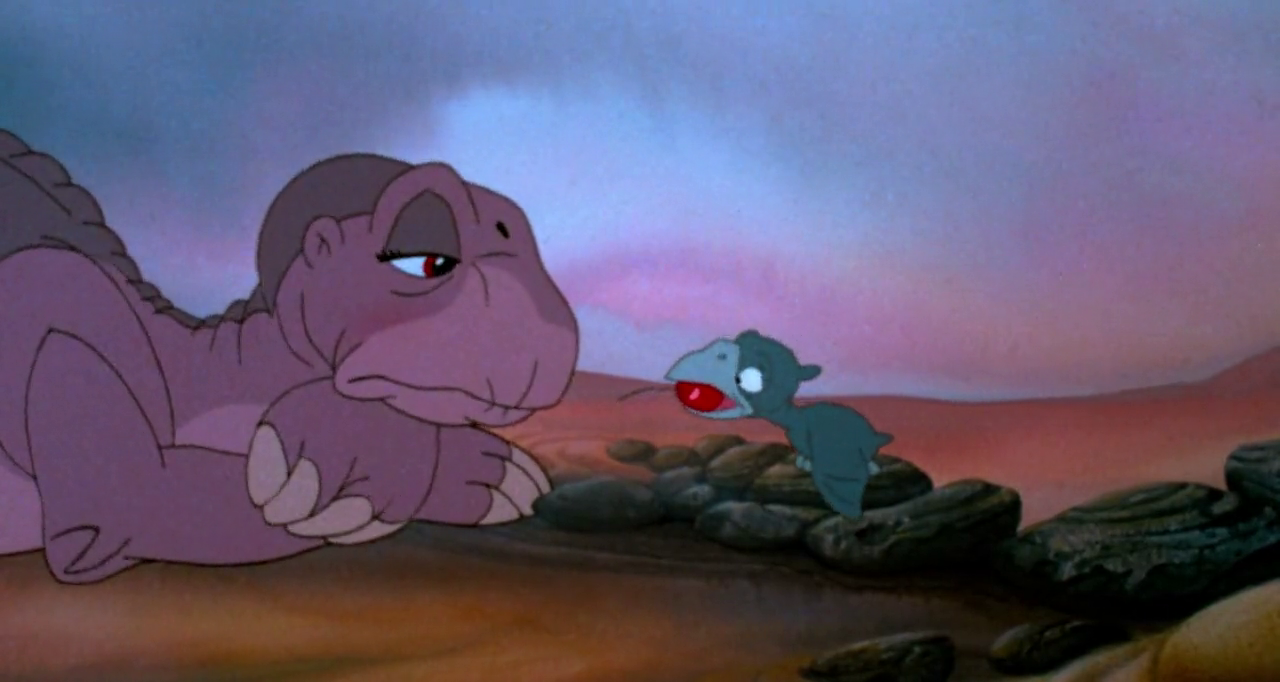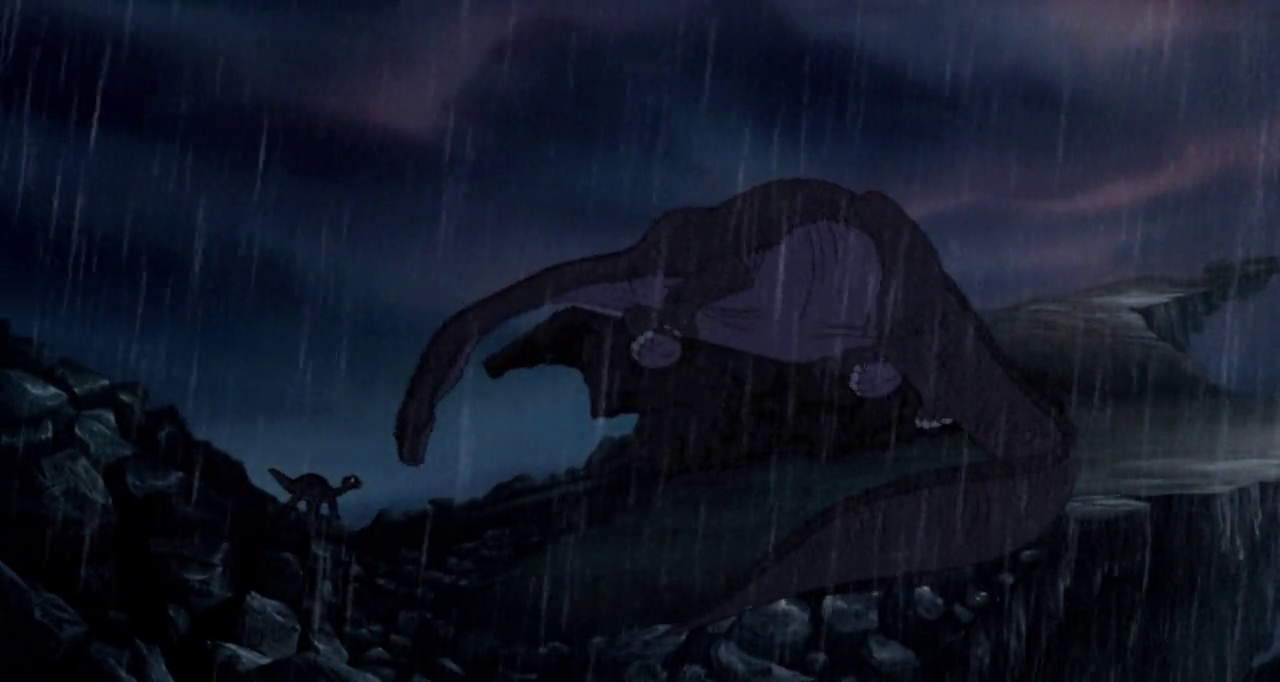Growing up in the 90s means, you probably watched Land Before Time. I’m sure there are a few people aged 25-40 who didn’t see this film, but their parents deprived them of an amazing experience. An experience that children should have. The film contains a heartbreaking loss for its main character Little Foot. Land Before Time’s death scene is unique exploration of an inevitable aspect of life, and one every child should watch.
The impact of Land Before Time was driven home when I watched it with my daughter. Three years old, she sat through the whole film. It’s only 66 minutes long, but she rarely sat through anything longer than 15 minutes video back then. The story of Little Foot’s journey to the Great Valley gripped her attention and never let go. What stole my attention was her reaction to Little Foot’s mother dying.
Sharptooth, a Tyrannosaurus Rex, nearly eats Little Foot and his friend Cera. Little Foot’s mother arrives in time to fight off the vicious predator. During the fight, an earthquake splits the land. Sharptooth and Mother fall in the great upheaval. Once the earthquake ends, Little Foot finds his mother laying on the ground, unable to move.
Land Before Time’s death scene
Her last act is ensuring her son’s best chance of survival. She repeats the directions to the Great Valley. Making certain he knows the path to safety. Then leaves her son with her last words. “Let your heart guide you. It whispers. So listen closely.” The camera slowly pulls back from the scene. Darkness settles in and we hear Little Foot call out “Mother, Mother…” The scene fades to black.
From a parental perspective, Land Before Time’s death scene strikes true. Knowing she’s dying, Mother’s last thoughts are of helping her son. She imparts vital information, which is how to get to the safety of the Great Valley, but also leaves him with words to guide him through the psychological pain her death will cause. She’s not concerned about dying. She’s concerned with how her death will affect Little Foot. In her last moment it’s her child she worries about.
While I connected with the mother, my daughter empathized with Little Foot. She slowly grasped that his mother wasn’t okay. Little Foot’s mother would not be with him anymore. Slowly she began repeating ‘his mother’s gone.’ This continued through the next few scenes. My daughter struggling to cope with the loss Little Foot was suffering. They took an emotional journey together.
Loss isn’t easily overcome
The next scene shows Little Foot tumble onto an old dinosaur named Rooter. At first he grumbles at the distraction but quickly realizes Little Foot’s distress. “She should have known better,” Little Foot says. “That was sharp tooth….why did I wander so far from home?” Of course, the child punishes himself for her death. He can’t grasp that his mother would never blame him.
Rooter tells him “it’s not your fault…it’s nobody’s fault. The great circle of life has begun. Not all of us arrive together at the end. You’ll always miss her, but she’ll always be with you.” These words are important. Nobody goes through life without experiencing the death of a loved one. It’s inevitable. Stories are a way of preparing ourselves life events in what little ways we can.
Rooter’s words affect Little Foot, but they don’t immediately erase the pain of his loss. In the next scene, Little Foot sits dejected on the ground as a happy family of pterodactyls march passed with cherries to feast on. One stops and offers his to Little Foot, trying to cheer him up. The gesture is wonderfully kind, but goes completely ignored. Grief is not easily overcome.

Lost in grief, Little Foot finds a footprint shaped like his mother’s from the start of the film. He attempts to curl into the footprint, reverting to when he was a newborn. A tree star falls from the sky accompanied by his mother’s voice. “I’ll be in your heart. Let your heart guide you.” The callback to her last words are powerful. In the moment his sorrow threatens to overwhelm him his heart speaks with the voice of his dead mother. What other voice would his heart speak in?
Throughout these scenes, my daughter continued saying “his mother’s gone” and “he sad.” The film doesn’t allow Little Foot to brush away his mother’s death. This means the audience can’t either. The viewer goes on the emotional journey with him. Seeing my child start making connections and empathizing with Little Foot was an amazing and sad time.
The film has a few more moments of sadness for its audience. Little foot mistakes his shadow for his mother. His joy is devastating for anybody old enough to know it’s false. For a child, they experience that disappointment alongside the character. Upon realizing it’s not her, the narrator tells us “Little Foot knew for certain he was alone.”
Rebuilding after loss
Little Foot isn’t alone for long. He crosses paths with Cera, the triceratops that he tried befriending at the beginning of the film. He’s happy to find a familiar face, but that happiness is quickly shattered. Cera throws her father’s words at Little Foot, telling him he’s not a three-horn and she won’t associate with anybody that’s not her kind. It’s a shocking moment of racism and reveals another type of impact loss has on people. Cera’s lost her family in the earthquake too. They’re alive, but on the other side of the great fissure the quake opened in the land. Without her father around, she keeps him close by honoring his words. That they’re racist doesn’t matter to her, because they’re his words. Her loss and love keep her isolated.
‘That’s not very nice,’ my daughter was angry at Cera. She wanted Little Foot to have a friend, somebody to help him. She couldn’t understand why Cera rejected him. I’m glad she couldn’t understand. What’s important in that scene for a child isn’t understanding Cera’s pain. That needs a more complex world view. That’s a moment for the parents. For a child, they’re journeying with Little Foot. The scene shows him try to be happy, and fail. If the film ended here it would horrible for kids, but thankfully Little Foot meets Ducky a moment later.
At first Little Foot tries to reject Ducky using Cera’s nasty words, but Ducky knows he doesn’t mean what he’s saying. She recognizes they’re both alone. Little Foot sees that too. Just like my daughter, Ducky empathizes with Little Foot’s situation. “I am all alone, I am. I lost my family in the big earth shake.” Together they build a new family. They soon meet Petrie and Spike. Eventually they even add Cera to their ranks.
Despite having his new family, they don’t replace his mother. Her voice guides him again during the rest of the film. She’s a part of him, always with him, even when she’s gone. Life’s like that. People dying doesn’t mean they lose their influence on you. They live on in memories and the impact they had on during your time together.
Land Before Time deals with death more realistically than most films. The weight of Little Foot’s loss carries throughout the story. His mother’s death influences every choice he makes, and impacts how he reacts to those around him. By showing him struggle, an audience of any age identifies with him. For the youngest likely empathizing with the loss of death for the first time.
Don Bluth’s film doesn’t treat children like fragile dolls. Children can handle far more emotional weight than many adults think. Difficult experiences help them grow. Everyone will encounter death eventually. There’s no true preparation, but Land Before Time’s death scene and narrative shows that grief and sadness are okay. Like Little Foot, one learns to keep going. Life carries on, but those we lose are not forgotten. They speak from our hearts.

